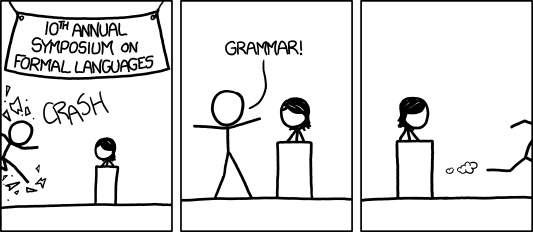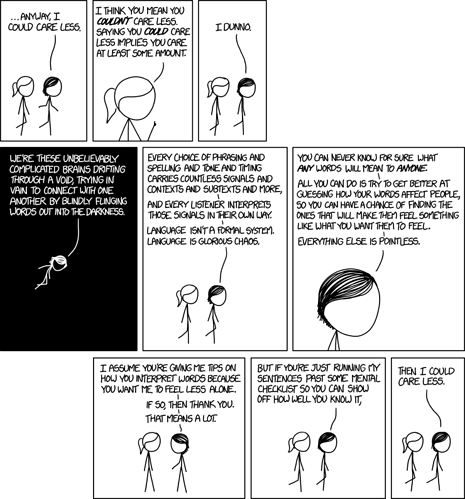We’re not at Oxford, they can keep their political strippers and just leave the rest of us alone. If I was talking about someone named Miss then I would clearly have capitalised the letter to differentiate between a name and a title.
Which is correct. I fail to see the problem here?
ARE YOU DOUBTING MY MIRACLES?
starts unliking posts furiously
It’s not just about capitalizing here, it’s also cuz there should have been a comma after ‘miss’
Not the way I’ve been taught English and sentence structure. There’s several ways to skin a cat and some of them specifies to never use a comma with and.
That doesn’t make any sense whatsoever; the reason you’d have to use 2 commas here is to set off the “direct address” of the ‘miss’ in question
would u also say u don’t use a comma in a compound sentence then?
I’ve proofread using several different style guides (both internationally-accepted ones and in-house-specific ones, and both in AE and BE), and I’ve never seen what u just mentioned ever anywhere
You can choose whether to use a comma or not before ‘and’ when listing several items if u wish y [I bought pears, apples(,) and bananas.] (which I guess is what u remember learning as u never use a comma in this case in BE, but u do in AE), and u also don’t use it before ‘and’ when it sets of a dependent clause, but u have to use ‘and’ when it sets off an independent clause (a new sentence within the same sentence), except when both clauses are quite short…
My fellow chronies, it matters not given that I see no problem whatsoever in being both a miss and a goddess.
Playboy billionaire by day, Dark Knight by night.
Works for me. Now take these coins and hush. 
Oxford comma > *
That’s not really an Oxford comma thou, you need a list of at least three items, you are meant to put a comma between the second and the last, although sometimes it’s omitted because the writer assumes the message is clear enough.
In this case, however, I’ve no idea what this comma is all about.
The comma here is used to set off ‘miss’, as she is being addressed directly. When you speak to a person directly, you set off the name of that person or their title or whatever you address them with using a comma before it and one behind it (unless it is the first or last word in the sentence of course).
As you said the Oxford comma is the example I gave where u list several things, and whether you use it or not is completely up to you or whatever style guide you’re following…
As @Inferry pointed out, omitting the comma here changed the meaning of the sentence quite drastically.
Ye, I meant that I don’t know how this particular type of comma is called or if it has a name at all.
Some ppl call it the “direct address comma” but i don’t think it actually has a name; it is usually just referred to under the heading “commas with direct address.”
https://www.youtube.com/watch?v=P_i1xk07o4g
EDIT: Forgot that this song has swear words, so language warning.
It really doesn’t, many sentences have potential to be wilfully misunderstood if one desires to do so. A lot of comedians uses this to make puns or short gags. What I wrote was also meant to be speech, spoken (even when written) and written language does not always follow the same patterns, best I’m willing to do for you is a ー to better mark the pause.
To continue the grammar theme, shouldn’t it be do not does? Since you are talking about things plural?
Obviously XKCD, but a note of it being such is always important.
And pre-emptively placing this here…
Correcting grammar is a funny thing.
This I might concede to, honestly I do not know. I feel like it’s singular at that point in the sentence. I am talking about language, not languages? I’d be happy if you could thoroughly explain why do would be correct.
I suppose it hinges upon the phrasing of the statement. I think the reason it sounds odd is the use of the ‘and’ prior to the does, and typically signifying either a new related thought or a plurality. I can certainly agree the phrase
language does not always follow the same patterns [when it is written or spoken]
Is correct. However, when using: “written and spoken language” it feels to me that it should be considered, as you have presented it, as a pair of things (my opinion here is muddled by the lack of language being plural, which I originally read it as).
Being but a biologist I obviously have limited grammatical knowledge (I recently had my mind blown when I was reminded of the ‘People and me’ versus ‘People and I’ rules).
Ok, then I think the full correction should probably be “spoken and written languages do” rather than just altering the do/does.
The plural part is “spoken and written.” Whether you say language or languages, the subject of the verb is plural regardless. This it’s up to the author’s connotation: to say language meaning in general, or languages implying specific district examples (albeit all of them).
while we’re on the subject of subject-verb agreement; this should be plural ![]() I wasn’t going to say anything when i saw it yesterday, as that’s not rly the point, but anyway
I wasn’t going to say anything when i saw it yesterday, as that’s not rly the point, but anyway
It shouldn’t actually, as ‘language’ is still singular, ‘spoken’ and ‘written’ are just adjectives of ‘language’ here; a red and blue car is still only one car

